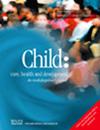Development of a Self-Care Autonomy in Health Scale for Late Adolescents
Abstract
Background
This paper describes the development of the Self-Care Autonomy in Health Scale for Late Adolescents (SAHSLA) for use with general samples. It addresses concerns regarding the nonclinical efficacy of self-care health scales for adolescents, particularly their ability to discriminate between lower levels of self-care.
Methods
A survey was constructed based on literature review and subsequently evaluated in two studies. Parents (N = 57, 53 parents of girls, 4 of boys, Mage = 15.96) participated in Study 1, which investigated the internal with Cronbach's alpha and coefficient omega (ω), and convergent validity with regard to adolescent age. In Study 2, the SAHSLA scores of adolescents (N = 339, 268 girls, 73 boys, Mage = 15.87) were examined using confirmatory factor and convergent validity analyses in relation to age, gender, smoking and alcohol consumption patterns, and self-compassion assessments.
Results
In Study 1, the scale total and a child's age did not substantially correlate. Both omega and alpha were moderate. Study 2 revealed a two-factor model with physical and psychological components. There were minor yet statistically significant associations found between self-judgement and psychological SAHSLA. Physical SAHSLA was not connected with age, overidentification, isolation or self-judgement, but it was statistically strongly correlated with total self-compassion.
Conclusions
The scale and study findings can be applied to health monitoring and interventions in schools and adolescent campaigns aimed at alcohol- and tobacco-use cessation.

 求助内容:
求助内容: 应助结果提醒方式:
应助结果提醒方式:


